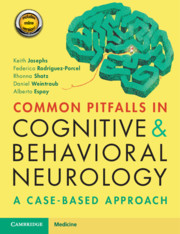Book contents
- Common Pitfalls in Cognitive and Behavioral Neurology
- Common Pitfalls in Cognitive and Behavioral Neurology
- Copyright page
- Dedication
- Contents
- Diseases Discussed in the Book
- Preface
- Acknowledgements
- Abbreviations
- Part 1 Missing the Diagnosis Altogether
- Case 1 It’s Just Old Age
- Case 2 Cognitive Decline Is Only Part of the Story
- Case 3 “I Keep Repeating Things to Him”
- Case 4 No Need to Worry: Your Neuropsychological Evaluation Was Normal
- Case 5 “Memory Is So Good She Will Never Get Dementia”
- Part 2 Misidentifying the Impaired Cognitive Domain
- Part 3 Missing Important Clues in the History
- Part 4 Failure of Pattern Recognition
- Part 5 Difficult-to-Characterize Cognitive/Behavioral Disorders
- Part 6 Clinical Findings That Are Subtle
- Part 7 Misinterpreting Test Results
- Part 8 Attributing Findings to a Known or Suspected Disorder
- Part 9 Missing Radiographic Clues
- Part 10 Management Misadventures
- Index
- Plate Section (PDF Only)
- References
Case 2 - Cognitive Decline Is Only Part of the Story
from Part 1 - Missing the Diagnosis Altogether
Published online by Cambridge University Press: 03 November 2020
- Common Pitfalls in Cognitive and Behavioral Neurology
- Common Pitfalls in Cognitive and Behavioral Neurology
- Copyright page
- Dedication
- Contents
- Diseases Discussed in the Book
- Preface
- Acknowledgements
- Abbreviations
- Part 1 Missing the Diagnosis Altogether
- Case 1 It’s Just Old Age
- Case 2 Cognitive Decline Is Only Part of the Story
- Case 3 “I Keep Repeating Things to Him”
- Case 4 No Need to Worry: Your Neuropsychological Evaluation Was Normal
- Case 5 “Memory Is So Good She Will Never Get Dementia”
- Part 2 Misidentifying the Impaired Cognitive Domain
- Part 3 Missing Important Clues in the History
- Part 4 Failure of Pattern Recognition
- Part 5 Difficult-to-Characterize Cognitive/Behavioral Disorders
- Part 6 Clinical Findings That Are Subtle
- Part 7 Misinterpreting Test Results
- Part 8 Attributing Findings to a Known or Suspected Disorder
- Part 9 Missing Radiographic Clues
- Part 10 Management Misadventures
- Index
- Plate Section (PDF Only)
- References
Summary
Most cognitive changes are usually described as problems with memory. These cases are an example of the importance of identifying what cognitive process is afffected in order to improve diagnosis and management.
- Type
- Chapter
- Information
- Common Pitfalls in Cognitive and Behavioral NeurologyA Case-Based Approach, pp. 4 - 6Publisher: Cambridge University PressPrint publication year: 2020

